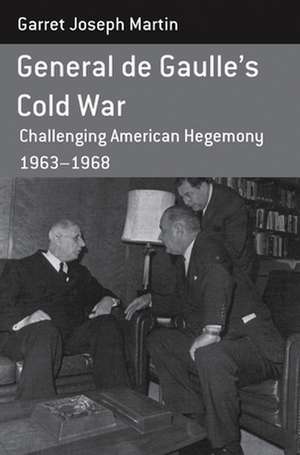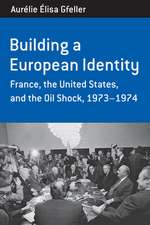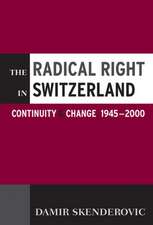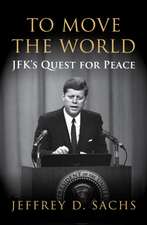General de Gaulle's Cold War: Berghahn Monographs in French Studies, cartea 13
Autor Garret Martinen Limba Engleză Hardback – 15 sep 2013
Garret Joseph Martin is an Editor-at-Large at the European Institute in Washington, DC. He obtained his PhD in International History at the London School of Economics. He co-edited Globalizing de Gaulle: International Perspectives on French Foreign Policies, 1958-1969 (with Christian Nuenlist and Anna Locher, 2011). He currently teaches courses on the Cold War at George Washington University and on transatlantic security at American University.
Din seria Berghahn Monographs in French Studies
- 14%
 Preț: 691.03 lei
Preț: 691.03 lei - 23%
 Preț: 749.15 lei
Preț: 749.15 lei -
 Preț: 258.07 lei
Preț: 258.07 lei -
 Preț: 260.41 lei
Preț: 260.41 lei - 23%
 Preț: 747.25 lei
Preț: 747.25 lei - 23%
 Preț: 748.86 lei
Preț: 748.86 lei -
 Preț: 259.05 lei
Preț: 259.05 lei -
 Preț: 261.18 lei
Preț: 261.18 lei - 23%
 Preț: 750.08 lei
Preț: 750.08 lei - 23%
 Preț: 747.55 lei
Preț: 747.55 lei -
 Preț: 259.80 lei
Preț: 259.80 lei - 23%
 Preț: 746.94 lei
Preț: 746.94 lei -
 Preț: 220.72 lei
Preț: 220.72 lei - 23%
 Preț: 750.08 lei
Preț: 750.08 lei - 23%
 Preț: 836.94 lei
Preț: 836.94 lei -
 Preț: 301.59 lei
Preț: 301.59 lei - 23%
 Preț: 748.57 lei
Preț: 748.57 lei - 23%
 Preț: 839.92 lei
Preț: 839.92 lei -
 Preț: 346.11 lei
Preț: 346.11 lei
Preț: 750.66 lei
Preț vechi: 974.88 lei
-23% Nou
Puncte Express: 1126
Preț estimativ în valută:
143.64€ • 153.60$ • 119.76£
143.64€ • 153.60$ • 119.76£
Carte tipărită la comandă
Livrare economică 18 aprilie-02 mai
Preluare comenzi: 021 569.72.76
Specificații
ISBN-13: 9781782380153
ISBN-10: 1782380159
Pagini: 282
Dimensiuni: 152 x 229 x 18 mm
Greutate: 0.55 kg
Editura: BERGHAHN BOOKS INC
Seria Berghahn Monographs in French Studies
ISBN-10: 1782380159
Pagini: 282
Dimensiuni: 152 x 229 x 18 mm
Greutate: 0.55 kg
Editura: BERGHAHN BOOKS INC
Seria Berghahn Monographs in French Studies
Notă biografică
Garret Joseph Martin is an Editor-at-Large at the European Institute in Washington, DC. He obtained his PhD in International History at the London School of Economics. He co-edited Globalizing de Gaulle: International Perspectives on French Foreign Policies, 1958-1969 (with Christian Nuenlist and Anna Locher, 2011). He currently teaches courses on the Cold War at George Washington University and on transatlantic security at American University.
Cuprins
List of Abbreviations Acknowledgements Introduction Part I: The Quest for Great Power Status, 1963-1965 Chapter 1. All (not so) Quiet on the Western Front Chapter 2. The Long Road to Moscow Chapter 3. A "Shining Light" for the World? Part II: The Rise and Fall of the Gaullist Design, 1966-1968 Chapter 4. 1966, Gaullist Zenith Chapter 5. Illusion of Independence Part 1, January-June 1967 Chapter 6. Illusion of Independence Part 2, July-December 1967 Chapter 7. The Fall, January-August 1968 Conclusion Bibliography Annexes Endnotes
Recenzii
"[The book] is extremely well researched, well written, and Martin accomplishes his stated objective: namely, to provide a more balanced account of de Gaulle that goes beyond views of him as either a visionary, or an irresponsible and anti-American nationalist - Martin's analysis makes a unique contribution in that it examines the linkages between the General's economic, political and security policy in order to understand how the three came together to shape his overall policy toward the US." * Erin Mahan, Chief Historian, Office of the Secretary of Defense "This is a very detailed, carefully argued and extensively researched study of de Gaulle's ambition to restore France's position as a global power during the last half of his presidency under the Fifth Republic by challenging the US claim to leadership of the Western, trans-Atlantic alliance during the Cold War." * John Kim Munholland, University of Minnesota "Drawing on very impressive research in document collections and memoirs from France, Great Britain, and the United States, Martin narrates the development, implementation, and rapid decline of de Gaulle's efforts to assert a new French role in the Cold War - In contrast to the English and French-language scholarship that treats de Gaulle as a strategic hero or an impetuous villain, this book re-examines this seminal figure as a Cold War politician. This is a compelling and very valuable portrait." * Jeremi Suri, University of Texas at Austin

















